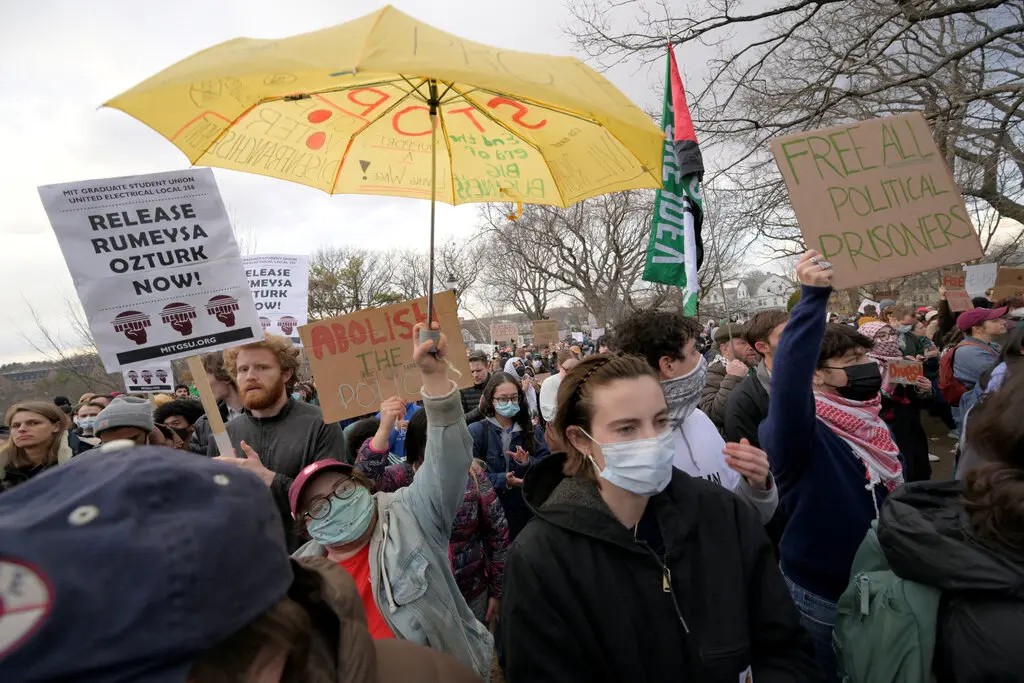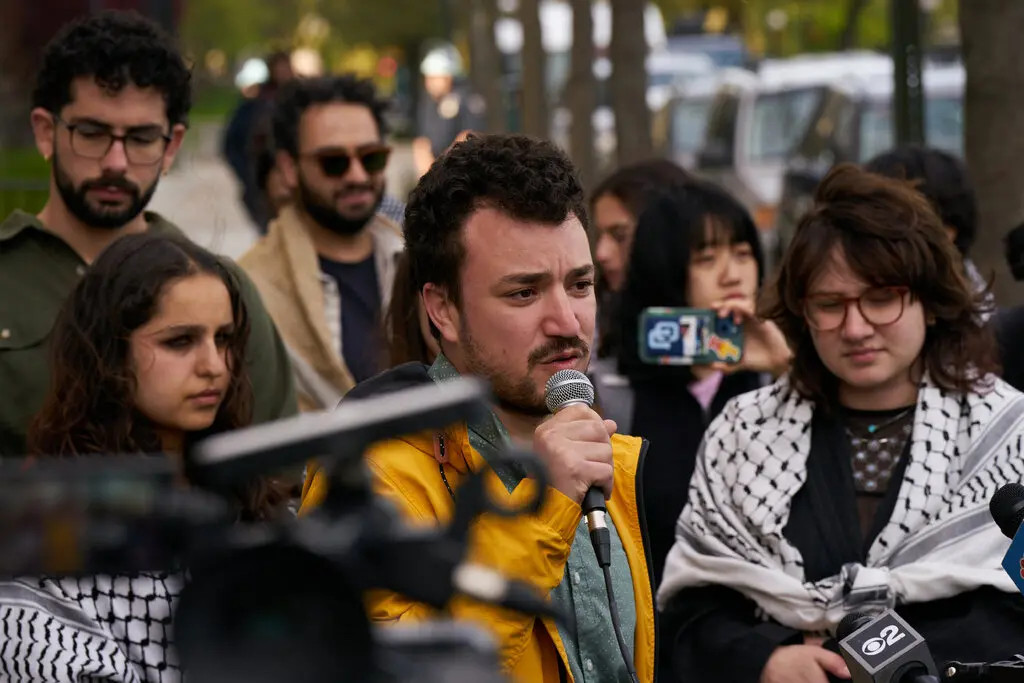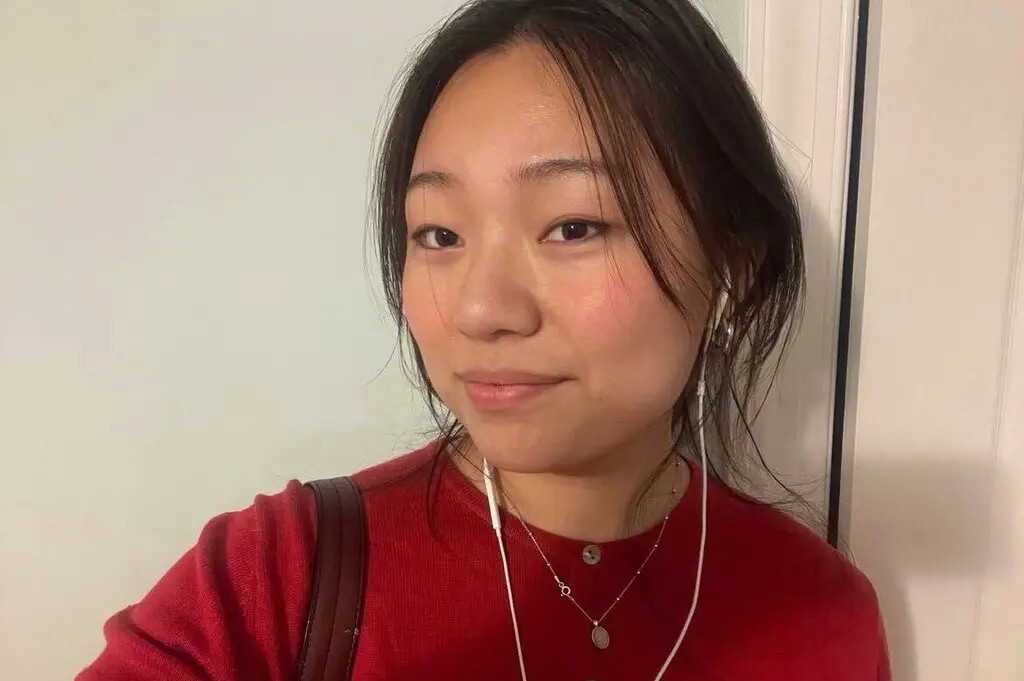
Date: 2026-03-03 Page is: DBtxt003.php txt00028544
THE TRUMP CHAOS
IMMIGRATION
The Trump Administration Revoked 800 Student Visas. Here Is What To Know.
IMMIGRATION
The Trump Administration Revoked 800 Student Visas. Here Is What To Know.

Demonstrators in Somerville, Mass., rallying in support of Rumeysa Ozturk,
a doctoral student at Tufts University who was taken into federal custody.
Credit...Faith Ninivaggi/Reuters
Original article: https://www.nytimes.com/2025/03/27/us/students-trump-ice-detention.html
Peter Burgess COMMENTARY
I don't think I have had this level of political anger as in these first few months of the Second Trump Administration.
I have had a negative view of Trump as a decent human being for between 30 and 40 years ... and nothing that is in process today is making me change my mind.
I went through the American (US) immigration process in my 20s in the 1960s. It was a very cumbersome and sloppy process back then and is probably considerably worse secades later.
In fact when I applied to come to the USA in London in the 1960s I was told it was going to take more than 6 months to process my application. I gave up on that idea and went to the Canadian High Commission in London, and two hours later had approval to migrate to Canada and had an free airline ticket to get me there!
Canada also solved another problem that I would have faced. I had recently married, and we were both looking to move from the UK to the USA. Though my new wife was British, she had been born in Egypt where her father was working for an oil company. Under US rules that made her Eqyptian ... and the wait time to get a visa for an Egytion was omething like 8 years! For her, getting entry to Canada became a non-issue!
Both the United States and Canada have some history in common. The North American continent has had very few indigenous people relative to its size, so there was plenty of space for migrants especially from Europe. In fact, with a massive shortage of people white Eurpeans imported both Africans (black people) and Chinese to help with the needed work like agriculture and building railroads! Around 1776, what are now the United States and Canada went their separate ways and over time have developed quite diferent national characteristics.
I mention this, because Trump seems to be out of touch and completely unaware of the national progress of Canada over time, and especially over the last few years!
Trump seems to think that he can insult other countries with complete impunity. This is a dangerous mistake for Trump and the USA. My understanding of history is that after the war and for several decades during the post war period the United States had huge economic power relative to everyone else ... and used it to its advantage. Every country in the world had to 'kow-tow' to US sensibilities and that was the way it was.
Fast forwad to the present time and Trump jas ramped up a weird new world order with the Trump USA calling the shots. This is not going down well and a new Trump induced reordering of global national priorities is now in process. My guess is that that the USA will end up on the bad end of this ... in my view, far worse than most Americans are able to imagine.
For me, Trump is very bad news, and some of his high profile 'buddies' like Elon Musk and Peter Thiel are also very rich and very dangerous. These two Pay-Pal collaborators are also deeply racist going back to their time in South Africa and Namibia!
Peter Burgess
The administration has not provided a reason for most cases, but some students have been targeted because of their pro-Palestinian activism.
A crowd of protesters gathers under a gray sky. One holds a large yellow umbrella with writing on it. Others hold signs. One sign reads: “Release Rumeysa Ozturk Now!” Many people are wearing masks.
Written by Kate Selig and Halina Bennet
Kate Selig is a Times national reporter and a member of the 2024-25 Times Fellowship class, a program for journalists early in their career.
Reporting was also contributed by Vimal Patel, Miriam Jordan, Halina Bennet, Edward Wong, Zolan Kanno-Youngs, Tyler Pager, Ana Ley and Hamed Aleaziz.
Published March 27, 2025 ... Updated April 11, 2025
The Trump administration has increased the number of students and academics it is seeking to deport in recent days, a new front in its efforts to restrict immigration.
About 800 international students have been stripped of their visas, according to universities and media reports. In late March, Secretary of State Marco Rubio told reporters that the administration was revoking visas daily.
The White House has asserted that some of these immigrants threaten national security, though some legal experts have said the administration is trampling free speech rights. In the vast majority of cases, however, immigration officials have not provided reasons. The identities of most of the students have not been publicized.
Some immigration lawyers said it appeared that many were pursued because they had broken laws, such as by driving under the influence.
Here is what we know about the students the Trump administration is seeking to deport.
Who is being targeted?
The affected students are, for the most part, in the United States with visas that allow foreign nationals to enter for full-time study. A handful have green cards, making them lawful permanent residents.
These students attend schools across the country, both private and public, including Arizona State University, the University of California and New York University.
While some students have been involved in pro-Palestinian activism, it appears a majority are not. Some of the visa revocations seem to be related to legal infractions in the students’ past.
“This is totally unprecedented,” said Fuji Whittenburg, an immigration lawyer in Calabasas, Calif., who is representing some of the students. She added, “A brush with law enforcement that didn’t necessarily result in an arrest or a conviction is all it took.”
This month, that visa was suddenly revoked.
Ms. Whittenburg said that one of her clients got a D.U.I. while studying in the United States more than a decade ago. When he applied for a second visa more recently, he disclosed the charge to U.S. consular authorities and was ultimately approved to pursue further studies.
A few of the cases have become high-profile examples of the administration’s efforts to combat pro-Palestinian activism on campuses, which some say could violate the First Amendment.
Mahmoud Khalil, a lawful permanent resident who is believed to be the first taken into custody, helped lead prominent protests at Columbia University against Israel’s war in Gaza. Mr. Khalil, who has Palestinian heritage, is married to an American citizen who was eight months pregnant when he was taken into custody. He was sent to a detention center in Louisiana.

Mahmoud Khalil speaking at Columbia University last spring. He helped
lead high-profile protests at the school against Israel’s war in Gaza.
Credit...Bing Guan for The New York Times
The administration also targeted Rumeysa Ozturk, a Turkish citizen and graduate student at Tufts University. She was taken into federal custody in late March after drawing the attention of a right-wing group that claims to combat antisemitism on college campuses and publicizes the names of students and professors online.
Ms. Ozturk had written an opinion piece in the student newspaper criticizing the university’s response to pro-Palestinian demands. The university said the essay did not raise any concerns.
A video of Ms. Ozturk’s detention, showing plainclothes agents from the Homeland Security Department detaining her as she was heading out to break her Ramadan fast with friends, has circulated widely online. “This video should shake everyone to their core,” her lawyer, Mahsa Khanbabai, said in a statement. Ms. Ozturk is also being held in Louisiana.
Whom else has the government sought to deport?
In dozens of cases, the government’s justification for revoking the visas is unclear or appears to be related to legal infractions that students committed, often years ago. Kseniia Petrova, a research associate at Harvard Medical School, was detained in February after officials revoked her visa for failing to properly declare frog embryo samples at the airport, according to her lawyer.
The Homeland Security Department also took Dogukan Gunaydin, a graduate student at the University of Minnesota, into custody and said his visa had been revoked over a drunken-driving case in which he pleaded guilty. His arrest was not connected to student protests, the department said.
And Xiaotian Liu, a Chinese doctoral student at Dartmouth College, had his visa abruptly revoked in early April, according to a lawsuit filed by the American Civil Liberties Union. The complaint stated that Mr. Liu had not committed any crimes or participated in any protests. A federal judge temporarily restored his immigration status on Wednesday.
Several other students and academics who have expressed pro-Palestinian views or have some connection to the war in Gaza have been detained or are being sought.
Ranjani Srinivasan, a Fulbright recipient from India who was pursuing a doctoral degree in urban planning at Columbia, fled to Canada after immigration authorities revoked her visa.
This month, that visa was suddenly revoked.
Yunseo Chung, a 21-year-old Columbia student and legal permanent resident from South Korea, has been pursued, though a federal judge has ordered the Trump administration to halt its efforts.

Yunseo Chung, a 21-year-old Columbia student and legal permanent resident from South Korea, has been targeted for deportation by immigration agents. Credit...CLEAR
Leqaa Kordia, a Palestinian student from the West Bank who had been involved in the protests at Columbia, was taken into custody by immigration agents after overstaying a student visa that was terminated in 2022.
Momodou Taal, a dual citizen of Gambia and Britain pursuing a doctorate at Cornell, was ordered to surrender to ICE. A prominent pro-Palestinian voice on campus, Mr. Taal had previously filed a pre-emptive lawsuit to block possible action against him, but later said he would leave the United States voluntarily.
Badar Khan Suri, an Indian citizen who was studying and teaching at Georgetown University, was detained at his home. He is married to a Palestinian American woman whose father is a former adviser to a deceased Hamas leader. A federal judge has temporarily blocked Mr. Suri’s deportation. He is “awaiting his court date” in Alexandria, La., according to his lawyer.
Dr. Rasha Alawieh, a kidney transplant specialist and professor at Brown University’s medical school, was deported. She was detained upon returning from Lebanon, her home country, and expelled in possible defiance of a court order. A lawyer representing a member of Dr. Alawieh’s family has vowed to continue fighting the administration.
Alireza Doroudi, an Iranian citizen and doctoral student at the University of Alabama, was detained by immigration officials. A Homeland Security official said that Mr. Doroudi “posed significant national security concerns” but did not provide additional information about his detention.
Are these detentions and deportations legal?
International students can lose their legal status if they violate the terms of their visas, such as by working in the United States without authorization. Their visas can also be revoked if they are considered a public danger.
Lawyers for some of these students argue that offenses like speeding or driving while intoxicated typically do not warrant deportation.
The Trump administration has justified some of the actions against students targeted for their pro-Palestinian activism by citing a rarely used provision of the Immigration and Nationality Act of 1952, which grants the secretary of state broad authority to expel foreigners deemed to pose “potentially serious adverse foreign policy consequences” for the United States.
Secretary Rubio has laid out a wide-ranging standard for whom he intends to deport under the law. But the crackdown appears to conflict with free-speech protections that lawmakers added in 1990 aimed at making deportations under the law over speech highly exceptional.
Lawful permanent residents are also protected by the Constitution, including free speech and due process rights, which could set up a major legal challenge. Lawyers for students whose visas have been revoked have similarly challenged the administration on constitutional grounds.
In some cases, the administration has also cited lower-level offenses to justify deportation efforts.
In Mr. Khalil’s case, the government added accusations against him after he was detained, saying he withheld information about his membership in organizations, including a United Nations agency that helps Palestinian refugees, when applying for permanent residency. One of Mr. Khalil’s lawyers dismissed these claims as “patently weak.”
More on Education in America
- Why Mahmoud Khalil Remains in Detention as Other Protesters Are Freed
- Republican Plan to Tax Elite Colleges Could Hit in Unexpected Places
- Mohsen Mahdawi, Released From ICE Custody, Graduates From Columbia
- Trump’s Push to Defund Harvard Prompts Clash Over Veteran Suicide Research
- Why Harvard Decided to Fight Trump
- As Harvard Battles Trump, Its President Will Take a 25% Pay Cut
- Kristen Stewart Thinks the Critics at Cannes Are Being Too Nice
- Is ‘Reef Safe’ Sunscreen Really Better?
- She Traded Brooklyn for Jackson Heights With $300,000 to Spend. Was It Enough for a One-Bedroom?
Are you an international student who has lost your visa or has chosen to leave the U.S. over deportation concerns?* 0 words